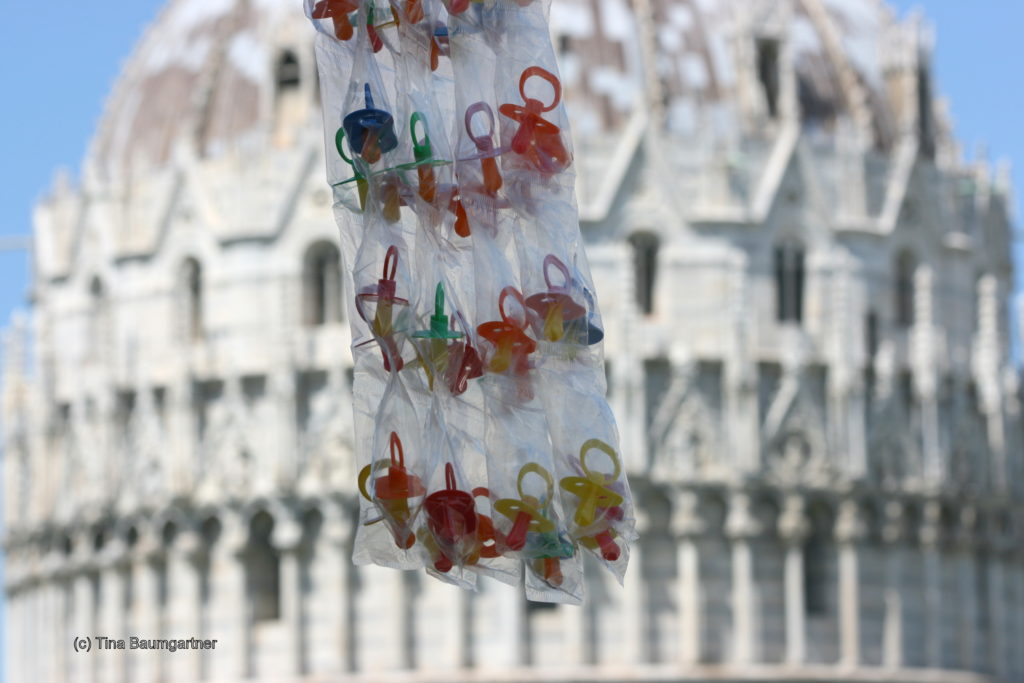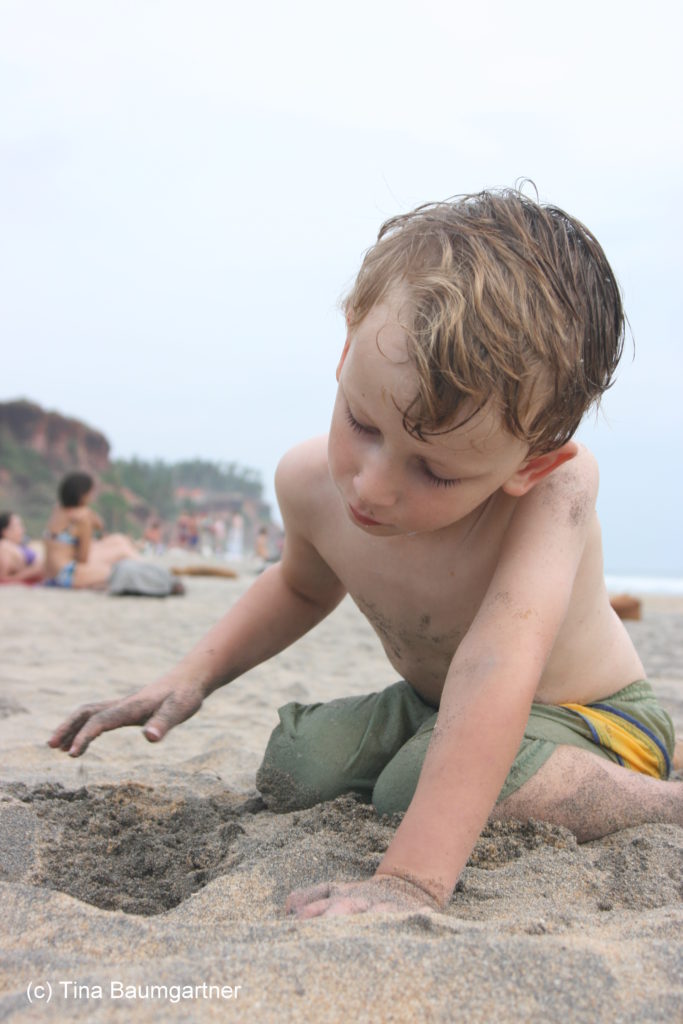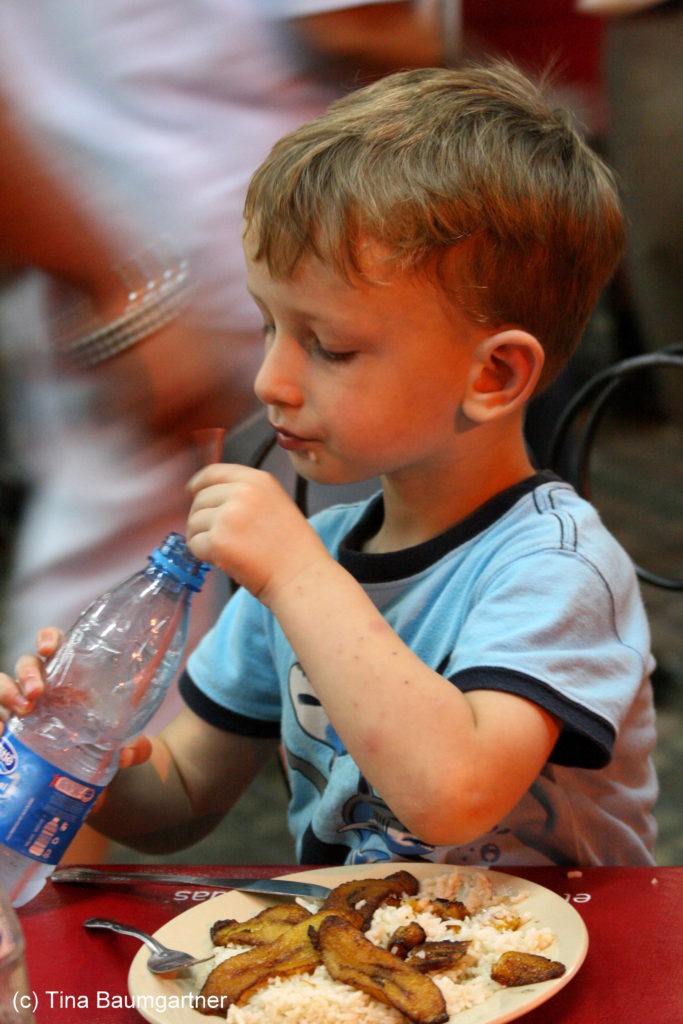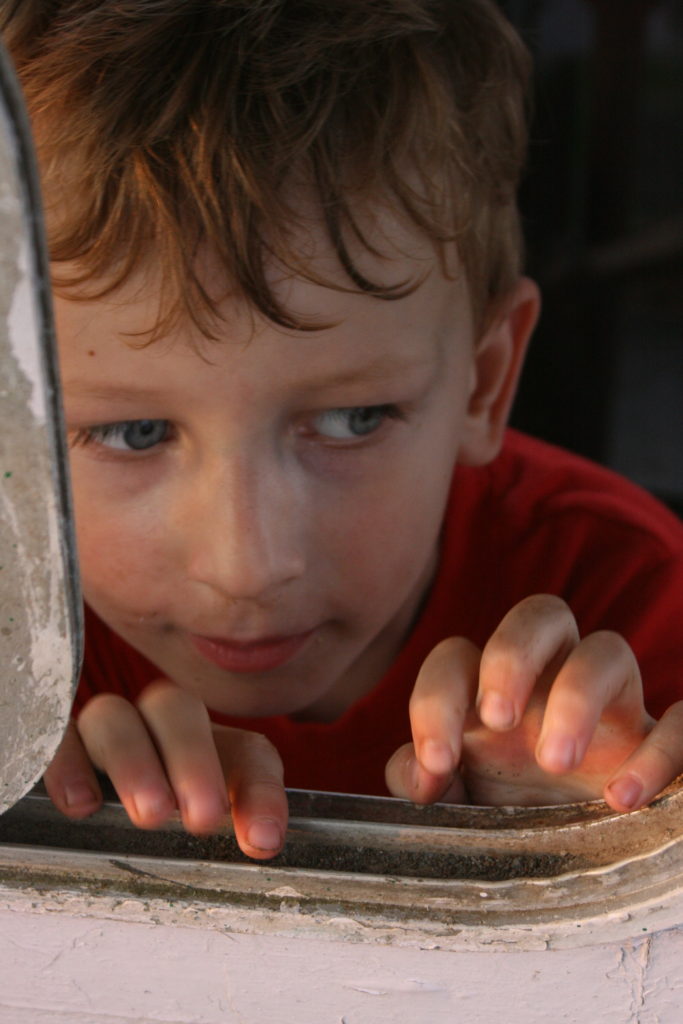
Traveling with a child is exhausting under the best of circumstances and during a sabbatical circumstances are not always the best. So you need to be prepared mentally and physically to deal with a crisis or better yet, avoid it. Every child is different and so the strategies used will be different for everybody. My son is a little geek and was, at the tender age of 2, already quite the little debater. He dislikes changes of routine, was and is very opinionated and likes to understand everything. Explaining stuff to him was always a good strategy to get and keep him involved. We knew this about him and took it into account in our planning. Still, a few general rules seem to apply to traveling with children.
Allow for Enough Down Time When Traveling With a Child

I felt overwhelmed at times from all the new impressions so chances are high that my little guy did as well. That’s where the frequent breaks, the hours spent on playgrounds that might or might not conform with US standards, the beach days, the zoo visits, and the idled-away afternoons at our respective homes came in. That’s why we didn’t chase breathlessly from one sight to the next, didn’t ride through a dessert on camel back and didn’t go rock climbing. Your little one needs time to process and something like a playground is perfect – despite their differences a playground is a playground, a zoo is a zoo and an afternoon folding and flying paper planes feels the same in San Jose, California or San Jose, Costa Rica.
The flip side is to not underestimate what your child can do. We were in Yucatan and there was no way that we wouldn’t see Chichen Itza or Uxmal. We visited these sites and explored them at our own pace – or rather his pace – which meant not getting all the details about the architecture, culture, and rituals, but instead spending some time admiring any and all tools or machinery that he found (and if there was a tool anywhere, he found it).
Get Help
Of course, during your travels you will be the 24/7 caregiver which can be quite exhausting, if one isn’t used to it. One possible solution is to find temporary daycare wherever you are. In Mexico, we did find a daycare that our son attended in the mornings so we had some grown-up time. Our child is very extroverted and so I recognize that this approach might not work for everybody. At the time he also spoke Spanish because he attended a full-immersion pre-school but we found that this is not a hard requirement: we sent him to a childcare in Kerala as well. He didn’t like it there as much as in Merida, but well enough to go.
This approach might not wok for all places. In Spain we tried without success to have him go to a pre-school. He was a bit too old for the private daycare places and the public preschools wouldn’t take him for insurance reasons. In Italy we ran into similar issues plus school vacation and decided not to fight the system because of a what would have been just a few days of morning care.
Establish a Routine
Kids like routine but that does not mean that they need to do the same thing in the same place all the time. There just needs to be some predictability to their life. Everywhere we got to we started creating routines within the first few days. It could be things like: every morning after we get up we lie in the hammock for 15 minutes and talk or read before we make breakfast. Or every Tuesday – and thankfully with a month’s time there were four Tuesdays or Sundays or whatever – we go to the local plaza, eat quesadillas, listen to the band and watch the people dance. Almost every day we go to the local park and chase pigeons and on days when he behaves well he’ll get a gelato on the way. In Italy the trash was collected every Thursday – an activity that unfailingly fascinated my son – so very early every Thursday I would get up and go watch the garbage truck with him. Of course, the guys operating it saw us not just standing there but running after the truck and he got to push all sorts of buttons to his great delight.
Even little things seemed to help: going to the same supermarket to buy food, taking the same route from the house into town, riding the same bus and not a different line that would have gotten us to where we need to go as well.
If we planned a change to these routines we started talking about the a few days in advance. We told him that we were taking an exciting trip by train to see the Leaning Tower in Pisa, that we would get up early, get ready quickly, eat a little breakfast and then – gasp – go to the big train station and ride one of those awesome trains for a bit.
In such instances it proved to be critical to sound very upbeat and excited about the adventure and portrait it not as a bothersome break in the beloved routine but an exciting outing after which we would return home and things would be as they ought to be.
Accept that there will be melt downs
By and large we had a great time but I’d be lying if I said it was all perfect. There were melt downs and they weren’t pretty. I remember him being an absolute nightmare the day we visited the beautiful old town of Lucca in Tuscany. I have no idea what possessed him and I have repressed most of the memory but remember a lot of screaming on all sides and a near complete breakdown of common civility. The next day, probably even the same evening, all was good again, but Lucca will forever be associated with a screaming three-year old for me.
These things happen at home and just because you are in a different country doesn’t make you or your child immune. So accept that it will happen, that it might derail your plans and then just deal with it the way you would deal with it at home.
Relax some Rules

Not everybody will like this one but this is what we did: we relaxed the rules on things like food and sleeping hours and a few other things. Sure, there should be veggies and fruit and not too much sugar and a balanced diet and all of that but after playing on the Zocalo in Merida or visiting the Alhambra in Granada we ended up eating tacos, French Fries, rice and fried bananas and ice cream for desert – in short, unhealthy yummy food. Neither one of us felt up to the quest for a salad of leafy greens and quinoa with a piece of steamed fish. Would have been ideal, admittedly, but didn’t happen.
Sleeping hours were the same. We strictly enforced reasonable early sleeping hours at home but it is really hard to make the argument to your child that he should go to bed when it is still light out and even younger kids are still playing in the streets. So he went to bed later than he ever did at home, got up later or napped longer. The upshot was, that we got to have dinners at a decent time even for adults. A few times we carried him home asleep or half asleep – but that’s okay as well.
Learn to love the dirt

If you are on a sabbatical, exploring new places chances are that you will be spending a lot more time outside than you generally do in the US. Spending time exploring and playing outside is great but it also comes with something that seems almost completely absent in the lives of many kids in the US: dirt! Not everywhere you go are playgrounds grounds covered with rubber mats or carpets. Not every store in the world has a disinfectant wipe dispenser at the door. Walking a lot is good exercise and an opportunity for every child to pick up tons of rocks, sticks and things unsavory. Walking, one can run one’s hand along buildings and fences, use lamp posts to twirl around – in short: there is ample opportunity to get ones clothing, hands, feet, and face dirty to the point of griminess.
I fought it and mostly lost. I drilled some basic rules into him, the most important ones were: “don’t put ANYTHING in your mouth”, “don’t lick your fingers – EVER for ANY reason”, “don’t rub your eyes with those hands” but otherwise I just accepted that my child was at times dirty and that it would help him develop a killer immune system. I also accepted that clothing would get dirty and that sometimes it did not make sense to put a clean shirt on him when the one from yesterday was still, well, okay. The fresh one wouldn’t last 15 minutes looking fresh anyway.
As always one has to strike the right balance. There are things, many things, that should not be touched but then licking ice cream from a sandy hand probably won’t kill anybody.
My boy did just fine – and he has a killer immune system. Whether that is due to good genes or a sabbatical spent secretly licking dirty fingers anyway I can’t say.
In summary:
When traveling with a kid
- allow for enough down time for your child to process all the new impressions
- establish comforting routines
- expect melt downs just as at home and deal with them accordingly
- relax some rules, going to bed later than at home won’t kill them
- learn to love the dirt and focus on establishing some basic common sense rules that must be obeyed
